Press freedom must be a priority for Tunisia’s future parliament, RSF says

Reporters Without Borders (RSF) is concerned that press freedom has not been an issue in the campaign for the parliamentary elections being held tomorrow (17 December) in Tunisia, although harassment of media personnel is growing and a radio journalist was recently given a one-year prison sentence.
“The misuse of existing laws to prosecute journalists is a dangerous development that recalls the failings of Ben Ali’s former police state. These new attacks on the right to report the facts confirm the need to provide journalism with better protection in Tunisia. The current indifference to this issue must be replaced with a sense of urgency. The future parliament must make press freedom one of its priorities before it is too late and before the achievements of the 2011 revolution are completely lost.
There has been no significant debate about press freedom during the campaign although the past few weeks have seen serious violations of this fundamental principle, including the one-year prison sentence passed on a journalist for an article about a terrorist cell, and another journalist’s interrogation for an article critical of the government.
In the first case, the journalist was tried under Tunisia’s terrorism law. In the second case, the journalist was summoned and questions under the controversial provisions of the very recent Decree-Law 54 on crimes related to information and communication systems – and contrary to the provisions of pre-existing press legislation.
The one-year prison sentence received on 29 November by Khelifa Guesmi, a journalist with privately-owned radio Mosaïque FM, has set a dangerous precedent. Tried by a court specialising in terrorism cases over an article about the dismantling of a terrorist cell, he was convicted of “intentional disclosure of information relating to interception, infiltration, audiovisual surveillance operations or data thereby collected.”
The prosecution accused Guesmi of endangering the investigation but this was disputed by his lawyers, who said his article had in no way hindered the operation and that it had even praised “the efforts of the security agents.” They also insisted that he should not have been arrested and tried under the terrorism law as there was no evidence of a terrorism-related motivation. Guesmi has announced his intention to appeal.
When arresting Guesmi, the authorities did not comply with article 11 of Decree-Law 115 (on press freedom), which says that “the sources of journalists in the exercise of their functions are protected, as well as the sources of any person who contributes to the preparation of journalistic material.” The authorities confiscated Guesmi’s phone and, by examining its contents, succeeded in identifying his source, a police officer who was sentenced to three years in prison.
The controversial Decree-Law 54 on cyber-crime, which was adopted in September, was used to harass Business News website editor Nizar Bahloul, who was summoned and questioned by security officials on 14 November, four days after writing an article under the pseudonym of Raouf Ben Hèdi that mocked Prime Minister Najla Bouden and her failure to combat Tunisia’s inflation and mounting social problems. He is the first journalist to be subject to proceedings under this draconian decree-law, whose repeal RSF had already requested.
